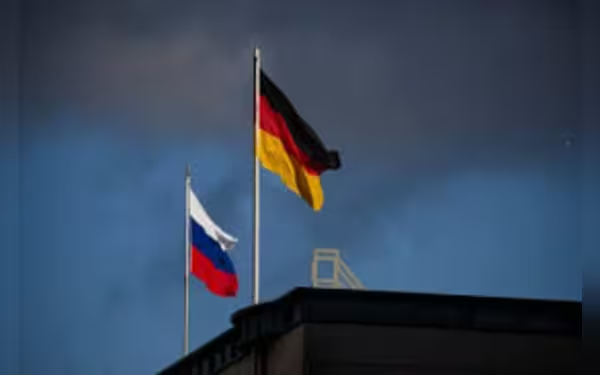Saturday, November 16, 2024 05:41 PM
Russia Summons German Ambassador Over NATO Naval Command Center
- Russia protests NATO's Baltic Sea command center establishment.
- Germany's Defense Minister emphasizes NATO's regional readiness.
- Tensions rise as NATO expands military infrastructure in Eastern Germany.
 Image Credits: thefrontierpost
Image Credits: thefrontierpostRussia summons Germany's ambassador over NATO's new naval command center in the Baltic Sea, escalating tensions amid defense readiness concerns.
In recent developments, tensions between Russia and NATO have escalated following the inauguration of a new NATO naval command center in the Baltic Sea region. This center, located in Rostock, Germany, aims to enhance defense readiness amid ongoing concerns regarding Russia's military actions in Ukraine. The establishment of this command center has prompted a strong reaction from Russia, leading to the summoning of Germany's ambassador by the Russian foreign ministry.
On Tuesday, Russia's foreign ministry expressed a "decisive protest" against the creation of the NATO center, emphasizing that the expansion of NATO military infrastructure in what was once East Germany could have severe repercussions. The ministry's statement highlighted the belief that leaders in Washington, Brussels, and Berlin must understand the potential negative consequences of their actions. Furthermore, Russia warned that this situation would not go unanswered, indicating a readiness to respond to what it perceives as a threat.
According to the Russian foreign ministry, the establishment of the naval command center is a "blatant breach" of the treaty that facilitated the reunification of Germany in 1990. This treaty explicitly stated that no foreign armed forces would be deployed in the area, raising concerns about the legality and implications of NATO's actions. The command center in Rostock will be under the leadership of a German admiral and will include personnel from 11 other NATO countries, aiming to coordinate naval activities and maintain a continuous maritime situational awareness in the Baltic Sea.
Germany's Defense Minister, Boris Pistorius, has underscored the importance of this center in bolstering NATO's presence and readiness in the region. As tensions continue to rise, the establishment of this command center reflects a broader strategy by NATO to enhance collective defense capabilities in response to perceived threats from Russia.
The situation surrounding the NATO naval command center in Rostock serves as a reminder of the delicate balance of power in Europe. As nations navigate the complexities of international relations, it is crucial for all parties involved to engage in dialogue and seek peaceful resolutions to avoid further escalation. The ongoing developments in this region will undoubtedly be closely monitored, as they hold significant implications for the future of European security and stability.













